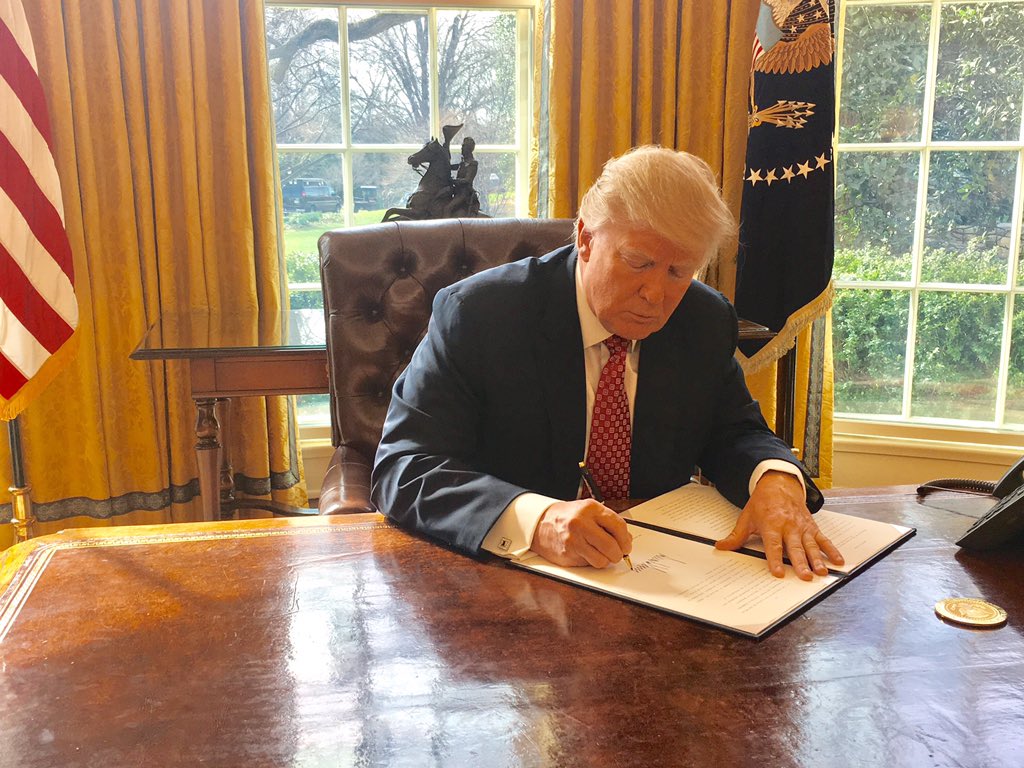Donald Trump is no longer a political virgin. This past Friday he lost his first major challenge – the failure of his Party to come up with an alternative to Obamacare. Their proposal was a halfhearted, deceitful bill that pleased nobody, and underlined some disturbing facts that we’ve always known – that there are huge philosophical divides within Trump’s own party that aren’t likely to be resolved, and the strong arm tactics that Trump used in his former life are completely useless in this one.
Whether the loss will embitter or educate the new president is really the question of the hour.

Image: Sean Spicer, White House Press Secretary @ twitter
Trump’s second month in office hasn’t been any smoother, but it has been slightly more civil, or at least conventional. Aside from insisting that ex-President Obama tapped his phones, he’s been quieter and less provocative, no doubt due to the tighter reins that his handlers have used to hold him in. Reports have circulated that he’s actually paid attention to briefings by intelligence agencies. Though he failed to come even close to creating consensus between Republican conservatives and moderates, he seemed to favor the more sensible electors in his party who wanted to retain at least some of the crucial elements of Obamacare. As bad as the failed bill was, it could have been worse.
One way to look at what’s happened this past month is that all the other aspects of the American democratic system ganged up – or dug in – against the bunch of rank amateurs in the White House.
Courts in three federal districts shot down the latest attempt at a travel ban, which seems to be a dead issue for the moment. Many state governors – the majority of whom are Republican – are already complaining about the president’s unreleased budget, saying that it takes too much money away from popular programs and puts the Republican majority in jeopardy in the next elections. Though Congressmen have tried to slow the process down, the FBI and National Security Agency have launched serious investigations into links between Trump’s people and Russian diplomats – and Trump’s wiretapping accusations against Obama are an embarrassment to everyone.
What we’re witnessing is the education of a man who expected to have much more power that he really has. Up to now, his tactics have been those of the standard New York hustler–real estate developer: threats, cajoling, inviting people to Florida resorts and fancy dinners, making fun of opponents in public and private. In other words, I’ll scratch your back if you scratch mine. The problem is that, as president, Trump has little to offer allies or opponents – not elected officials, not judges, not even career bureaucrats. His own popularity is so far down in the dumps that any sane Republican is busy putting distance between himself and a dysfunctional White House.
This will only get worse.
So what can we expect in month three of the Trump Presidency? He can waste time devising ways to take revenge on his political opponents. He can grow depressed and sullen – and bored– and give over more power to his advisors to run the show. He can do what President Obama did in the last two years of his presidency: ignore the Congress and issue a flood of executive orders that became de facto laws. Though the travel bans failed, the White House has already issued dozens of executive orders in the areas of environmental protection and financial regulation, and we’re bound to see more.
Or he can do something that no one has talked about very much – work with Democrats and moderate Republicans to produce legislation that fulfills some of his better campaign promises, such as job stimulus and infrastructure development. Whether this could in fact come about depends on whether he just wanted to win the election, or if he actually wanted to get anything done.
The fact is that many of the new President’s populist ideas are similar to those of a Democratic Party that over the past thirty years lost its bearings as much as the Republicans lost theirs. Could a realignment of parties be possible, much in the style of a parliamentary coalition, and leave the Tea Party Republicans to themselves?
This may be nothing more than a wild pipe dream. Republicans and Democrats in the US haven’t worked well together since the days of brilliant compromisers like Tip O’Neill and Everett Dirksen, and brilliant manipulator–Presidents like Lyndon Johnson and Ronald Reagan. Yet if, as Maureen Dowd’s recent NY Times column suggested, Trump’s need to win made him the dupe of “the Republican leadership and the business community, who set [him] up to do their bidding,” maybe last week’s loss will remind him that he might once have had real intentions to help the American lower-middle-class.
It’s a faint hope, but in these days of a confused and self-destructive democracy, faint is better than nothing.







